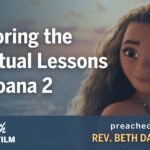Rituals That Ground Us | Rev. Dr. Daniel Kanter | 10.08.23
As a church that is not a liturgical church in the traditional sense we sure do have a lot of rituals! How and why are rituals in our lives good for us?
This sermon kicks off our Rituals That Ground Us sermon series, the second series in the Waves of Purpose, Tides of Change theme year.

Sermon Transcript
Years ago I interviewed Huston Smith, a world renowned scholar of religious studies, and he told me that every morning he woke up and when he saw the sun, he yelled, “Aho.” A native prayer taught to him by a Winnebago medicine man, Ruben Snake, because the sunlight brings the vegetation and the beauty of all life. And then he said, the next thing he does is he prays the Islamic Prayer of the Morning. And then he says he does a half an hour of yoga, followed by a reading of a chapter in the Bible. He said to open himself to such insights that might enter. I asked, “Why do you do these practices?” And he replied, “Rabbis say that the first word you should think of when you wake up in the morning is the word God. Not even thank you should precede it.”
When I heard all this, I surveyed my waking rituals. I wake up and I stumble around to find my glasses and I yell, “Damn,” when I drop my phone, while I’m looking at the weather. I brush my teeth, I did grow up in a house with a dentist. I wander in the dark to the kitchen, I make a cup of tea, I do the Wordle and then I either get on a bicycle and ride or I go to the gym, and then I make my way to the office and do my emails. And the days go by as the Talking Heads said.
Now I’m thinking that you’re thinking, either this isn’t the holy man I hoped to listen to this morning or you’re thinking this is exactly the kind of holy man I want to listen to this morning. Either way, I want to remind you that I am not holier than thou and I cautioned you before that holier than thou people are hell to live with.
Sunday Morning Rituals
But in reviewing the contrast of my life with Huston Smith, I realized that I do have rituals that ground me. Sunday mornings start very early, I am usually here by 07:15. In my office, I light incense from a Buddhist monastery I spent time at in Nepal. I pray Dietrich Bonhoeffer’s Morning Prayer that goes, “O God, early in the morning I cry to you. Help me to pray and gather my thoughts to you. I cannot do it alone.”
And today I pray for my family and with my friends and today, especially this week, I pray for the people I lived with on the kibbutz, on the border of the Gaza Strip who are hiding their children from terrorists. And I prayed for the Palestinians who came and crossed the fence at Gaza to work with us in the orchards in that same kibbutz.
And then I read from Howard Thurman, his writings are like a minister to me. Every minister needs a minister. And even though he died in 1981, his writings speak to me and through them I listen. And then I do a short meditation and then I read a Psalm. And then I read a whimsical poem by Billy Collins or a serious poem by May Sarton. And then and only then do I start to prepare for you, writing prayers for worship, sermon editing, last minute touches on Sunday worship.
I do all those things Sunday to open myself to such insights that might enter.
Maintaining a Weekly Rhythm
And then on Monday our staff meeting starts with the lighting of a chalice and then the whole staff breathes together for a moment of pause. And then on Wednesday, I spend time quietly writing, listening for inspiration. And then on Friday, it’s the Sabbath for me. No work, no email, no answering messages. If I can get away with it. And I’m not Orthodox, but I try to have a day of restoration and pause. And then Saturday is for exercise with friends and time with family and then closing up shop in the evening in preparation for Sunday. I have lived this version of this pattern for almost 25 years. It is the predictable rhythm of the week that sustains my ability to be your minister, to plan and to participate in work that happens beyond these walls and to be a parent and to be a spouse.
The Significance of Rituals
And of course there are interruptions, some difficult and some joyful. There are deaths and there are hospital visits and there are weddings and there are surprises of joy. But on the whole, what I would call “life rituals” happen in this predictable manner. And for me they are constant reminders that life is both mundane and sacred. These rituals establish in my life kinds of reminders that we all have lots of things to do to get through the week, but we also have cravings for deeper things in the world. Cravings for direction for our spiritual lives, for orientation that points us beyond the mundane to gratitude for the preciousness of this fleeting and fragile life I live. What helps us lift the lens in life is rituals of sorts. Whether they’re established practices or casual repetitions, they mark the moments of life’s meanings and changes and help us make sense of the world. They ask us where we fit, how we see our part in the whole, and point us in directions of what is important to sustain and help us prioritize what we crave.
Ritual as Poetry in Action
“Ritual is poetry in action.” The Rabbi Chaim Stern once said, “Ritual is poetry in action.” He meant that ritual does for behavior what poetry does for words. Religious deeds grace ordinary activities the way poetic language elevates commonplace communication. For instance, when a wedding ceremony provides a spiritual context for looking back on years of day in and day out, parenting, carpools, afterschool activities, patience and love. Ritual cause us to take pause to reflect on the labors and wonders of providing for and witnessing an emerging adult. “Ritual is poetry in action.”
That’s what a religious community such as ours does, it worships and it celebrates to help us to restructure the ordinary as sacred.
And they tell us something about who we are and what we care about. Every Sunday, the whole experience here is a ritual. We light a chalice, a symbol of hope, for liberty, for all and the light of life that shines in us. We say an affirmation that is our promise to uphold each other. We sing a blessing, we practice hospitality when we greet one another. We practice generosity when we pass the plate around and half of you ignore it. We reflect on words of poems and stories and listen to preachers ramble on because somehow in our lives we need this. We need to prioritize an hour of reflection, of being filled up for the week, of being reminded of what matters.
And it is also true here in worship because this is a spiritual pause at the close of a work week, an opportunity to take stock and to renew. What we do here on Sunday gives us time to consider the rote behaviors of work and life. What we do here points to the sacred in the mundane. What we do here should help you render the monotonous into a spiritual context, help you recognize the contribution you make to the larger overarching goal of family or community or yourself.
And it’s rituals that ground us in our commitments and remind us who we are. And powerful are rituals that we do here, even led by people who stumble around in the morning in the dark just looking for a cup of tea. Because they are done by a group of people who aren’t holier than thou and do or don’t believe any God is receiving them. Because we know like our ancestors did that coming together, that singing doxologies and saying affirmations and reflecting on poems is a source that will help us act together to meet and overcome the crisis and the danger when it comes, it strengthens us for the days ahead. Our rituals, whether the ones in our homes or here in the church, should help us also see the holy in others, should help us to practice giving ourselves away to one another when we are called on to give life to those who need it.
Prayer as a Humble Ritual
And one ritual that we do here in church that nails all these things is when we bow our heads and pray. We ground ourselves when we pray in the needs of others. And prayer helps us not because we believe that God is up there taking notes on our prayers. We pray to tune the heart, to center others’ lives in our own, not to make requests for miracles in the world. When we pray, we practice at its core humility, the ability to pay attention to others, to feel the needs and desires of others in our lives. That’s what we’re doing.
So we have a ritual that we do once every couple of years to practice this humility, to hold another’s prayer, to see what we can do with it and to make our lives more hopeful and more grounded. So I’m inviting you now, there’s a prayer card or blank card in your order of service or online, there is a form. I’m inviting you to write a prayer that you need someone else to carry because the prayers you write on those cards will be redistributed and we’ll invite you to take one home with you, someone else’s to carry for the week.
I’m inviting you to write a personal prayer request, not peace in the Middle East, as important as that is. But my sister is ill and she needs your prayers or my friend is struggling and he needs your prayers. When you’re done, I invite you to pass them to the edges of the pews and the ushers will take them and then we’ll redistribute them to you to take home to ponder for the week. So I invite you to stop and pause and find a prayer that you need someone to carry for you this week. Write it down and pass it to the end of the pew. For those of you online, if you put your email in the form, we will email you an anonymous prayer to carry for the week.
I don’t know if you have to greet the morning sun with aho or just stumble around to the coffee pot. But I do know that if you spend a little time each day quietly contemplating someone else’s prayer this week, that it might help you see the kindness in all things, that we are truly blessed because we are born and we will die soon within a true circle of motion. And maybe your life will be a little more grounded and you might find that such a ritual will get you through the week. The power in this practice is not only naming a prayer that you hope someone else carries but carrying someone else’s prayer this week. So if you’ll pass those prayers to the ends of the pews, the ushers will collect them as we sing the closing hymn.







